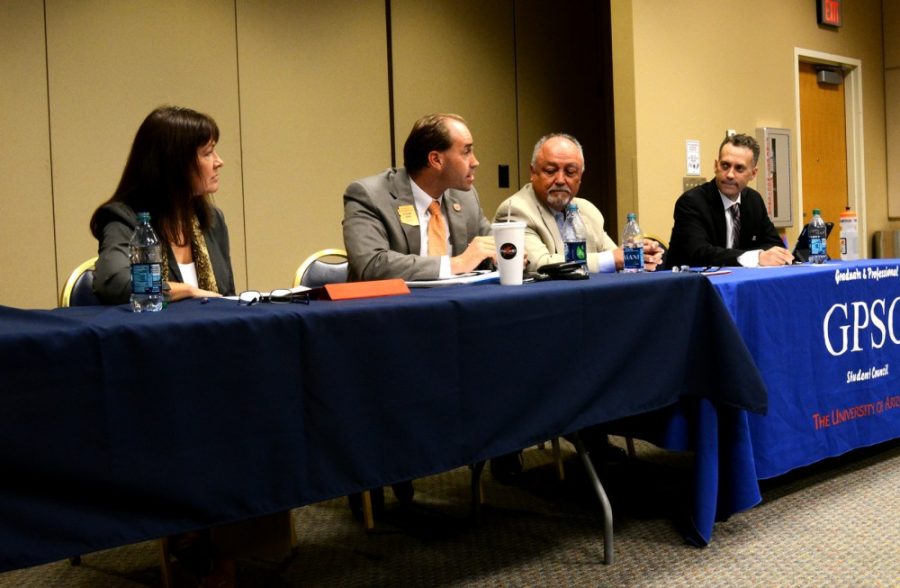The UA Graduate and Professional Student Council held a town hall session on Tuesday where state representatives discussed issues pertaining to graduate students, including education funding and reduced tuition for DREAMers.
The three state representatives featured on the panel were Ethan Orr, Macario Saldate, and Victoria Steele. The moderator, Dan Gibson, editor of the Tucson Weekly, asked the representatives prepared questions then opened the floor for audience questions and concerns at the end.
Deyanira Nevarez Martinez, the president’s chief of staff for GPSC, said the purpose of the event is to promote student engagement.
“As citizens of the country and this state it’s important to be engaged in the political process and be informed about the things that are going on in our state legislature that could potentially affect us,” Nevarez Martinez said.
When discussing state funding for education, Orr emphasized the benefit not only for students, but the entire state.
“I view it as an essential investment in our community and in our future,” Orr said. “It’s not just your benefit that we’re funding, it’s our entire community benefit … We’re not going to become the state we want to become unless we fund education.”
Another topic discussed at the meeting was the “Pay It Forward, Pay It Back” program being piloted in Oregon, which allows students to attend college tuition-free and pay back a percentage of their income when graduating. While the program has not been implemented in Oregon yet, graduate students at the UA asked state officials to consider a similar program as an option for Arizona, Nevarez Martinez said.
The overall goal is to make going to school and especially graduate school more affordable, Nevarez Martinez said.
Panelists also offered their thoughts on the Dream Act, which concerns students who are undocumented immigrants but have lived in Arizona most of their lives. These students cannot be granted in-state tuition because it’s against Arizona law.
Steele said the state legislature can’t change that law unless voters or Congress choose to do so.
“I don’t think we’re going to get that anytime soon,” Steele said.
Another concern for graduate students, which was addressed during the town hall, related to healthcare for students. Since the average age for graduate students is 31 and the average age for student professionals is 26, according to Nevarez Martinez, the need for healthcare is higher for that student population.
“A lot of us are older and have children and have been out in the workforce and have come back to school,” Nevarez Martinez said.
Nevarez Martinez said these students must rely on themselves to pay for school, get out of debt and pay their loans off.
Those in attendance voiced concerns, not only over healthcare benefits, but also funding for graduate student programs, financial aid and avoiding debt upon graduation. Orr said student concerns are important to take into account.
“Most of the students just wanted to know about overall funding,” Orr said. “And I think they had very valid concerns that we need to be looking at.”
– Follow Maggie Driver @Maggie_Driver








